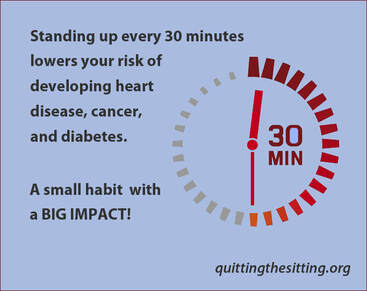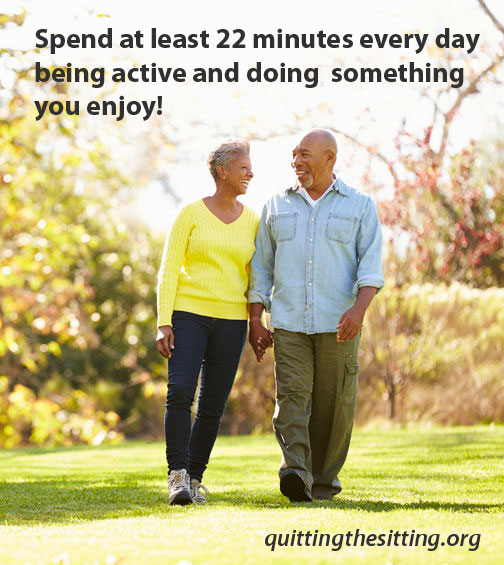You have one life. Don’t sit it out.
The scientific evidence is clear: excessive sitting increases your risk of dying prematurely. But just as importantly, sitting too much also reduces the quality of the years you do have. Sedentary people have more chronic diseases, higher rates of obesity, more joint pain, more depression and anxiety, and they report feeling less energetic and less happy than people who are more active. You are meant to live a full, vibrant, active life, pursuing your interests and passions and spending time with the people you love. Sitting too much can ruin the goals and ambitions you have for your life.
If you want to build a better life for yourself, we recommend 3 things:
If you want to build a better life for yourself, we recommend 3 things:

1. Take Regular Breaks: Stand or move every 30 minutes. Use reminders or natural breaks in your day as cues to get moving. Initially, it might require effort, but it will become a natural habit over time.
2. Incorporate Movement: Seize every chance to move more throughout your day. Walk to a colleague's desk instead of emailing, take calls on the go, use stairs, and park farther away from entrances.
Grocery stores and other shops always have plenty of parking for people willing to walk a minute or two. Be one of those people.
2. Incorporate Movement: Seize every chance to move more throughout your day. Walk to a colleague's desk instead of emailing, take calls on the go, use stairs, and park farther away from entrances.
Grocery stores and other shops always have plenty of parking for people willing to walk a minute or two. Be one of those people.
|
|
Dr. Mike Evans wants us all to "Make Our Day Harder". On the surface, "Make Our Day Harder" sounds like the worst marketing campaign ever. Who wants to make their day harder? Yet the weight of medical evidence backs him up: these small steps have a disproportionately big impact on our health. It’s hard to live with chronic pain. It's hard to carry excess weight. It’s tough to manage diabetes and heart disease. By making your day just a little harder, you may indeed be making your life a lot easier in the long run. |
|
3. Choose Enjoyable Activities: Find something you enjoy doing that will have you up and moving at least 22 minutes a day. Why 22 minutes? Because being active for at least 22 minutes a day ensures you meet the public health recommendation of 150 minutes of moderate exercise per week. Yes, more daily movement is even better, but 22 minutes a day is all it takes to meet this recommended guideline. And those 22 minutes don’t have to be all at once. Start with 5 or 10 minutes if you need to. Start where you are, do what you can, and go from there. Think of it this way: 22 minutes is just 1% of your day. But it's the 1% that will make the other 99% of your day much better! |
